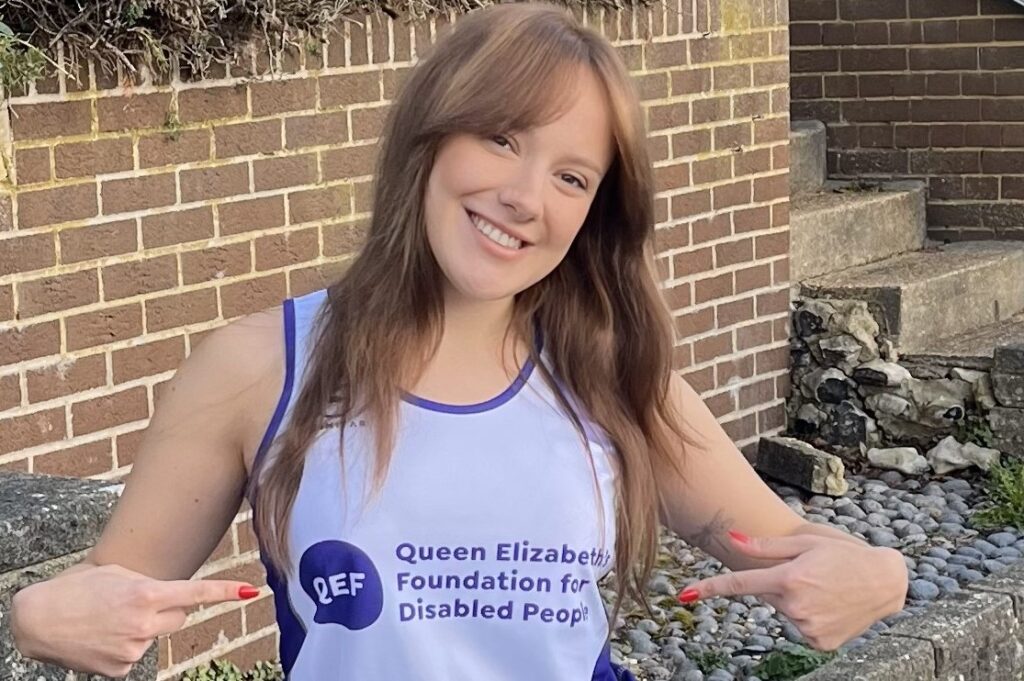Dr. Holly Hurn, QEF’s Clinical Psychologist, talks about the hidden disabilities that can result from an acquired brain injury (ABI) which can make everyday life difficult, and how important it is that there is greater awareness to support people trying to cope after such a traumatic life event.
“My primary role as Head of Psychology at QEF’s Care and Rehabilitation Centre is to support our clients who have had a stroke, an acquired brain injury or other neurological condition to better understand their diagnosis and regain their confidence and sense of self. Loss of identity can be a significant part of a neurological injury – often people find themselves dependent on somebody else for the first time since childhood. They may become fearful for the future and their self-confidence can be knocked.
We seek to understand our clients’ personal values; what drives them and what makes them who they are. We then try to support our clients to reconnect with those values in a meaningful way. This process can help someone regain a sense of control over a sudden, unexpected change in life path. It can help guide someone forwards through a period of uncertainty and rebuild their sense of self.
An acquired brain injury (ABI) can present in different ways – people may primarily notice cognitive changes, physical changes, emotional/personality changes or all of these. Our cognitive abilities are our thinking skills – they include our attention, information processing, memory and higher-level executive functions such as planning and problem-solving. A neurological injury can really affect how we process the world around us, so someone may be able to walk and talk with no obvious outward disability, but there can be hidden disabilities that families and friends may not be expecting. At QEF the Psychology team work closely alongside Occupational Therapists, Physiotherapists and Speech and Language Therapists to enable our clients to start to understand and adjust to their injuries and rebuild their core life skills and independence as much as possible.
A number of areas of the brain may be affected by an ABI or stroke. It is very common for someone to feel high levels of both cognitive and physical fatigue and require lots of breaks or rests. They may also experience reduced attention span and reduced processing speed which could make something seemingly simple, like following a TV programme, very challenging. Similarly working memory is often affected which can impact on someone’s ability to follow a conversation and retain the content. Some people also experience a hyper-sensitivity in certain senses e.g. they could struggle with bright lights (photosensitivity) this can especially be the case with strip lights such as those found in in supermarkets, or they might be very sensitive to sound (hyperacusis), so walking past building sites or being in crowded spaces can be challenging. Headaches are also common after head injury, as well as vestibular challenges which can cause dizziness and balance difficulties. All these changes can be very subtle but together can make a ‘normal’ day completely exhausting.
ABI/stroke can also affect our emotions and behaviour. It is common for clients to find they become tearful much more easily than they would have previously, or they might find themselves laughing inappropriately or feeling more irritable and easy to snap than they did previously. Other people find they become ‘emotionally numb’ and struggle to feel anything really at all following a brain injury. Emotional changes can be caused by the head injury itself but also by the consequences of the head injury. A combination of high levels of fatigue, reduced information processing, sensory overload and psychological trauma can all lead to feeling frustrated, anxious or low in mood. It can be hard for friends and loved ones to understand what is going on for the individual – they might find themselves on the receiving end of these emotional changes and not know how best to respond.
In the context of these cognitive and psychological changes, getting back to work/previous roles can be challenging for somebody who has had an ABI. Doing things that were perhaps easy before, such as composing an email, can feel fatiguing and sometimes overwhelming. Reduced short-term memory may mean that at the end of phone call you can’t remember what was discussed – you just ‘go blank’. Your processing speed may also be slower, so it takes longer to take in information, make sense of that information and then create the required output. This can improve over time, but it can be hard work and often needs the individual to adapt their approach to certain tasks in order to achieve them. Pacing oneself with regular breaks and interspersing tasks that give you pleasure or satisfaction throughout your day are key in maintaining focus, energy and productivity.
Managing stress is also key, as stress itself can slow down and impact on cognitive processing, memory and attention which creates a vicious cycle. Practicing skills such as relaxation or Mindfulness and engaging in regular gentle exercise, eating well and getting good sleep can all help with managing stress. At QEF we utilise bio-feeedback technology to help clients monitor their own physiological responses to stress and learn how to activate their own state of relaxation. Over the years I’ve found biofeedback a really helpful way to educate clients about the function and importance of relaxation on the body and brain.
As Psychologists at QEF, we aim to help our clients understand how these changes and challenges might apply to them and give them tips and strategies to cope with their difficulties. We work collaboratively towards goals identified by clients and tailor these in line with their progress. We also help support clients with low mood and anxiety which are very common given the challenging situations people can find themselves in following a neurological injury. Our new centre, The CRC, is based just outside Leatherhead in Surrey and provides an ideal setting to help a client maximise their emotional, as a well as physical and cognitive, recovery following a neurological injury. We have beautiful grounds in which to run groups, 1:1 sessions and (COVID-safe) family meetings.
As we approach discharge, clients can sometimes experience a mixture of excitement if they are returning home and feel a bit daunted about leaving the support and structure of the CRC. We work closely with the client and their family to support them through this process and facilitate a smooth handover to community teams involved in their ongoing care.”
QEF provide expert neuro rehabilitation at our Care and Rehabilitation Centre, supporting people to rebuild key life skills and maximise their independence after a stroke, acquired brain injury, incomplete spinal injury or other neurological condition. Contact the team on neurorehab@qef.org.uk

